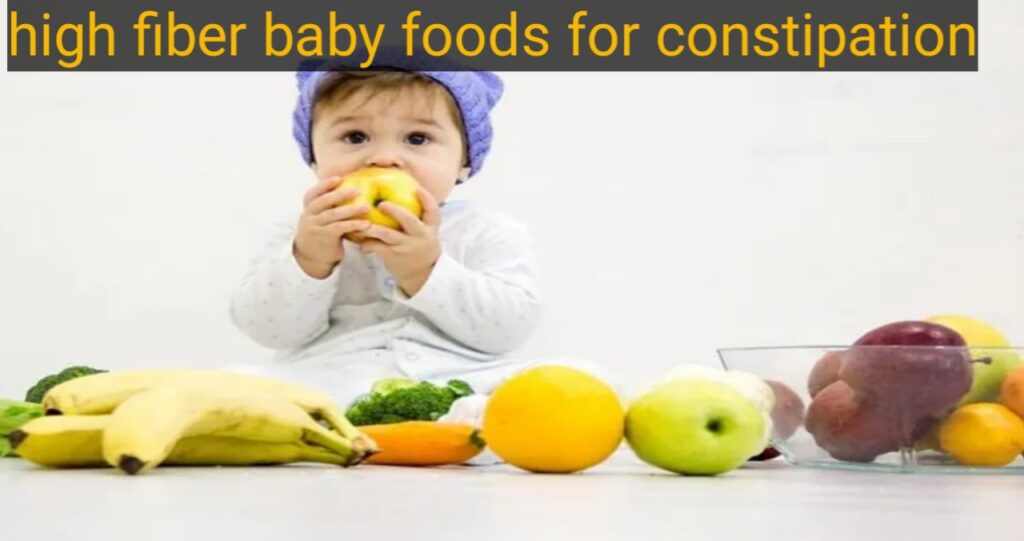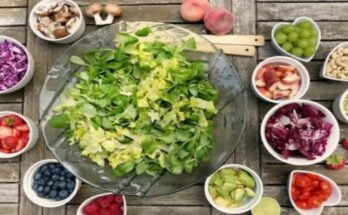
এক পলকে
high fiber baby
ntroducing high-fiber foods to your baby’s diet can be beneficial for their digestive health and overall well-being. However, it’s important to introduce them gradually and ensure they are age-appropriate. Here are some high-fiber foods that you can consider introducing to your baby’s diet:
Fruits: Many fruits are high in fiber. Soft, ripe fruits like bananas, applesauce, pears, peaches, and prunes (in puree form) are great options for babies.
Vegetables: Cooked and pureed vegetables like sweet potatoes, peas, carrots, broccoli, and squash are good sources of fiber for babies. Make sure to cook them until they’re soft and easy to mash.
Whole Grains: Offer whole grain cereals and bread specifically made for babies. Brown rice, oatmeal, barley, and quinoa are also excellent sources of fiber. You can prepare them as a porridge or mix them into purees.
Legumes: Lentils, split peas, and beans (such as black beans, kidney beans, and chickpeas) are high-fiber foods. You can introduce them to your baby’s diet by cooking them until soft and mashing or pureeing them.
Prunes and Apricots: Prunes and dried apricots are known for their laxative properties and can help alleviate constipation in babies. You can puree them or soak them in water to soften them before offering them to your baby.
Avocado: Avocado is a nutrient-dense fruit that is also rich in fiber. You can mash ripe avocado and offer it to your baby as a spread on toast or as a standalone puree.
Remember to introduce new foods one at a time and watch for any signs of allergies or digestive discomfort. It’s also important to consult with your pediatrician before making any significant changes to your baby’s diet, especially if they have any underlying health conditions.
high fiber baby foods for constipation
If your baby is experiencing constipation, incorporating high-fiber foods into their diet can help alleviate the issue. Here are some high-fiber baby foods that may help relieve constipation:
Prunes: Prunes, or prune juice, are well-known for their natural laxative properties. You can offer pureed prunes to your baby or dilute prune juice with water and offer it in small amounts.
Pears: Pears are rich in fiber and sorbitol, a natural sugar alcohol that has a mild laxative effect. Cooked and pureed pears are gentle on your baby’s stomach and can help regulate bowel movements.
Plums: Like prunes, plums are high in fiber and sorbitol, making them effective in relieving constipation. Pureed plums can be introduced to your baby’s diet to help soften stools and promote regular bowel movements.
Broccoli: Broccoli is a fibrous vegetable that can aid in digestion and relieve constipation. Steam or boil broccoli until it’s soft and then puree it for your baby. Be sure to introduce broccoli gradually to prevent gas or digestive discomfort.
Sweet Potatoes: Sweet potatoes are rich in fiber, which can help regulate bowel movements. Steam or bake sweet potatoes until they’re soft, then mash or puree them for your baby to enjoy.
Brown Rice: Brown rice is a whole grain that contains more fiber than refined white rice. Cook brown rice until it’s soft and offer it to your baby as a part of their meals. You can also mix cooked brown rice with pureed fruits or vegetables for added flavor and nutrition.
Oatmeal: Oatmeal is another excellent source of fiber that can help soften stools and promote regular bowel movements. Cooked oatmeal can be served warm or cooled, depending on your baby’s preference.
Remember to introduce high-fiber foods gradually and offer plenty of fluids to help prevent constipation. If your baby’s constipation persists or if you have concerns about their health, consult with your pediatrician for personalized advice and recommendations.
high fiber foods for babies 6 months
At six months, your baby is ready to start exploring solid foods alongside breast milk or formula. When introducing high-fiber foods to a six-month-old baby, it’s essential to offer them in a form that is easy for them to eat and digest. Here are some high-fiber foods suitable for six-month-old babies:
Pureed Fruits: Soft and ripe fruits are excellent sources of fiber for babies. Apples, pears, peaches, bananas, and avocados are great options. Peel, core, and cook fruits until they’re soft, then puree them until smooth before offering them to your baby.
Pureed Vegetables: Cooked and pureed vegetables like sweet potatoes, carrots, peas, squash, and green beans are rich in fiber and essential nutrients. Steam or boil vegetables until they’re tender, then puree them until smooth for your baby.
Baby Cereal: Fortified baby cereals, such as rice cereal, oatmeal cereal, or barley cereal, can be introduced at around six months. Opt for whole grain varieties for added fiber. Mix the cereal with breast milk, formula, or water to achieve a smooth consistency.
Legumes: Cooked and mashed legumes like lentils, chickpeas, black beans, and kidney beans are high in fiber and protein. Start with small amounts and gradually increase as your baby gets used to them.
Whole Grain Bread: Soft and thinly sliced whole grain bread, toasted or untoasted, can be offered to babies at six months. Cut the bread into small pieces or strips to make it easier for your baby to handle.
Fruit and Vegetable Puree Blends: Combine different fruits and vegetables to create flavorful puree blends for your baby. Mix and match options like apples with spinach, bananas with blueberries, or sweet potatoes with carrots.
Remember to introduce new foods one at a time and wait a few days before introducing another new food. This helps you monitor for any signs of allergies or digestive issues. Additionally, always supervise your baby during feeding, and consult with your pediatrician if you have any concerns or questions about introducing high-fiber foods to your six-month-old baby.
high fiber baby food recipes
Here are some simple and nutritious high-fiber baby food recipes that you can try for your little one:
Prune Puree:
Ingredients: 4-5 prunes, water (as needed)
Instructions:
Soak the prunes in warm water for about 15-20 minutes until they soften.
Remove the pits from the prunes and place them in a blender or food processor.
Add a little water and blend until you achieve a smooth puree consistency.
Adjust the thickness by adding more water if needed.
Serve a small amount to your baby as a high-fiber snack or mix it with other purees.
Sweet Potato and Lentil Mash:
Ingredients: 1 sweet potato, ¼ cup red lentils, water or low-sodium vegetable broth
Instructions:
Peel and chop the sweet potato into small cubes.
Rinse the red lentils under cold water.
In a pot, combine the sweet potato cubes, red lentils, and enough water or vegetable broth to cover them.
Bring to a boil, then reduce heat and simmer until both the sweet potato and lentils are soft and cooked through, about 15-20 minutes.
Mash the mixture using a fork or potato masher until you reach the desired consistency.
Let it cool before serving to your baby.
Banana Oatmeal Puree:
Ingredients: 1 ripe banana, 2 tablespoons baby oatmeal, breast milk or formula
Instructions:
Mash the ripe banana in a bowl until smooth.
Cook the baby oatmeal according to the package instructions, using breast milk or formula instead of water for added nutrition.
Combine the mashed banana and cooked oatmeal in a bowl and mix well.
Let it cool to a safe temperature before feeding it to your baby.
Spinach and Pear Puree:
Ingredients: 1 ripe pear, a handful of fresh spinach leaves, water (as needed)
Instructions:
Peel and core the pear, then chop it into small pieces.
Rinse the spinach leaves thoroughly.
Steam the pear pieces and spinach leaves until they are soft.
Place the steamed pear and spinach in a blender or food processor and blend until smooth, adding water as needed to achieve the desired consistency.
Serve it to your baby as a nutritious and high-fiber puree.
These recipes provide a good balance of fiber and nutrients for your baby’s healthy development. Adjust the ingredients and textures according to your baby’s preferences and dietary needs. Always ensure that the food is at a safe temperature and supervise your baby during feeding.
high fiber baby cereal
You can easily make high-fiber baby cereal at home using whole grains. Here’s a simple recipe for homemade high-fiber baby cereal:
1/4 cup of whole grain oats
1 cup of water or breast milk/formula (for cooking)
Instructions:
Rinse the oats thoroughly under cold water.
In a small saucepan, bring the water or breast milk/formula to a boil.
Stir in the rinsed oats and reduce the heat to low.
Simmer the oats, stirring occasionally, for about 10-15 minutes or until they are soft and cooked through. Add more liquid if needed to reach the desired consistency.
Once cooked, remove the saucepan from the heat and let the cereal cool down to a safe temperature.
You can serve the high-fiber baby cereal as is, or you can puree it using a blender or food processor for a smoother texture, especially if your baby is just starting solids.
If desired, you can mix in some mashed fruits or vegetables for added flavor and nutrition before serving.
This homemade baby cereal provides the goodness of whole grains and is high in fiber, making it an excellent choice for your baby’s diet. As always, make sure to supervise your baby during feeding and consult with your pediatrician if you have any concerns or questions about introducing new foods to your baby.
high-fiber foods for toddlers constipation
If your toddler is experiencing constipation, incorporating high-fiber foods into their diet can help alleviate the issue. Here are some high-fiber foods that are suitable for toddlers and can aid in relieving constipation:
Fruits: Many fruits are high in fiber and can help soften stools. Offer fruits such as apples, pears, berries (like raspberries and strawberries), oranges, kiwi, and prunes. You can serve them fresh, sliced, or pureed.
Vegetables: Vegetables are excellent sources of fiber and can promote regular bowel movements. Encourage your toddler to eat a variety of vegetables such as broccoli, peas, carrots, sweet potatoes, spinach, kale, and squash. Steam or cook them until they’re tender and easy to chew.
Whole Grains: Whole grains are rich in fiber and can add bulk to stools, making them easier to pass. Include whole grain options in your toddler’s diet such as whole wheat bread, whole grain pasta, brown rice, oatmeal, barley, quinoa, and whole grain cereals.
Legumes: Legumes are high in fiber and can help regulate bowel movements. Offer legumes like lentils, black beans, kidney beans, chickpeas, and peas. You can include them in soups, stews, salads, or puree them into dips or spreads.
Nuts and Seeds: Nuts and seeds are nutritious snacks that provide fiber and healthy fats. Offer small portions of nuts like almonds, walnuts, and peanuts (if not allergic) or seeds like chia seeds, flaxseeds, and pumpkin seeds. Make sure to serve them in a safe form for toddlers to prevent choking hazards.
Dried Fruits: Dried fruits such as prunes, apricots, raisins, and figs are concentrated sources of fiber and can help relieve constipation. Offer them as a snack or mix them into oatmeal, yogurt, or baked goods.
Fluids: Ensure your toddler stays well-hydrated by offering plenty of fluids throughout the day, primarily water. Sufficient hydration helps soften stools and facilitates bowel movements, which can alleviate constipation.
Encourage your toddler to eat a balanced diet that includes a variety of high-fiber foods, and make mealtime enjoyable and stress-free. However, if constipation persists despite dietary changes or if you have concerns about your toddler’s health, consult with a pediatrician for further evaluation and advice.
fiber for babies 1 year old
For babies who are one year old, introducing high-fiber foods is important for their overall health and digestive system. Here are some fiber-rich foods that are suitable for one-year-old babies:
Fruits: Offer a variety of fruits such as apples, pears, peaches, plums, apricots, bananas, berries (strawberries, blueberries, raspberries), and kiwi. These fruits are rich in fiber and provide essential vitamins and minerals.
Vegetables: Introduce a range of vegetables including sweet potatoes, carrots, peas, broccoli, cauliflower, spinach, kale, squash, bell peppers, and tomatoes. These vegetables are packed with fiber and nutrients crucial for your baby’s growth and development.
Whole Grains: Incorporate whole grain foods into your baby’s diet such as whole grain bread, whole wheat pasta, brown rice, barley, oats, quinoa, and whole grain cereals. These grains provide dietary fiber, vitamins, and minerals.
Legumes: Offer legumes such as lentils, chickpeas, black beans, kidney beans, peas, and edamame. Legumes are excellent sources of fiber, protein, and other essential nutrients.
Dried Fruits: Introduce small amounts of dried fruits like raisins, apricots, prunes, figs, and dates. Dried fruits are concentrated sources of fiber and provide energy for active toddlers.
Nuts and Seeds: Provide finely chopped or ground nuts and seeds such as almonds, walnuts, peanuts (if not allergic), chia seeds, flaxseeds, and pumpkin seeds. These nuts and seeds offer healthy fats, protein, and fiber.
When introducing high-fiber foods to your one-year-old, ensure that the foods are age-appropriate, properly cooked, and cut into small, manageable pieces to prevent choking hazards. Offer a variety of foods from different food groups to ensure a well-rounded diet. Always supervise your baby during mealtime and consult with your pediatrician if you have any concerns or questions about your baby’s diet or digestion.
high fiber foods for 1 year old
Certainly! Here’s a list of high-fiber foods suitable for a one-year-old:
Fruits:
Apples (peeled and cooked until soft)
Pears (cooked until soft)
Peaches (cooked until soft)
Plums (cooked until soft)
Apricots (cooked until soft)
Bananas
Berries (blueberries, strawberries, raspberries) (cut into small pieces)
Vegetables:
Sweet potatoes (cooked until soft)
Carrots (cooked until soft)
Peas (cooked until soft)
Broccoli (cooked until soft)
Cauliflower (cooked until soft)
Spinach (cooked and finely chopped)
Kale (cooked and finely chopped)
Squash (cooked until soft)
Whole Grains:
Whole grain bread (cut into small pieces)
Whole wheat pasta (cooked until soft)
Brown rice (cooked until soft)
Oatmeal (cooked until soft)
Barley (cooked until soft)
Quinoa (cooked until soft)
Legumes:
Lentils (cooked until soft)
Chickpeas (cooked until soft)
Black beans (cooked until soft)
Kidney beans (cooked until soft)
Green peas (cooked until soft)
Dried Fruits:
Raisins (cut into small pieces)
Apricots (cut into small pieces)
Prunes (cut into small pieces)
Figs (cut into small pieces)
Dates (cut into small pieces)
Nuts and Seeds:
Finely chopped or ground almonds (if no allergy)
Finely chopped or ground walnuts (if no allergy)
Finely chopped or ground peanuts (if no allergy)
Chia seeds (softened in water)
Flaxseeds (ground)
Pumpkin seeds (finely chopped)
When offering these foods to a one-year-old, ensure they are cut into small, manageable pieces to prevent choking hazards. Also, always supervise your child during mealtime and consult with a pediatrician if you have any concerns about your child’s diet or digestion.
fiber-rich foods for 9 month baby
Introducing fiber-rich foods to a 9-month-old baby can be beneficial for their digestive health and overall nutrition. Here are some fiber-rich foods suitable for a 9-month-old:
Fruits:
Apples (cooked until soft and mashed)
Pears (cooked until soft and mashed)
Bananas (mashed)
Prunes (cooked until soft and mashed)
Peaches (cooked until soft and mashed)
Avocado (mashed)
Blueberries (mashed or cut into small pieces)
Vegetables:
Sweet potatoes (cooked until soft and mashed)
Carrots (cooked until soft and mashed)
Squash (cooked until soft and mashed)
Peas (cooked until soft and mashed)
Green beans (cooked until soft and mashed)
Spinach (cooked until soft and finely chopped)
Broccoli (cooked until soft and mashed)
Whole Grains:
Oatmeal (cooked until soft)
Brown rice (cooked until soft)
Quinoa (cooked until soft)
Whole grain bread (softened with breast milk, formula, or water and cut into small pieces)
Whole grain pasta (cooked until soft and cut into small pieces)
Legumes:
Lentils (cooked until soft and mashed)
Chickpeas (cooked until soft and mashed)
Black beans (cooked until soft and mashed)
Kidney beans (cooked until soft and mashed)
Dairy and Dairy Alternatives:
Plain yogurt (look for options with no added sugar)
Cottage cheese (softened and mashed)
Tofu (softened and mashed)
Others:
conclusion:
Softened whole grain cereals (look for options with no added sugar)
Chia seeds (softened in water or mixed into purees)
Ground flaxseeds (mixed into purees)
When introducing these foods to a 9-month-old, it’s important to ensure they are cooked until soft and cut into small, manageable pieces to prevent choking hazards. Additionally, always supervise your baby during mealtime and consult with a pediatrician if you have any concerns about your baby’s diet or digestion.



